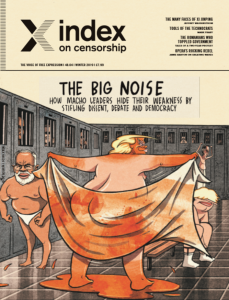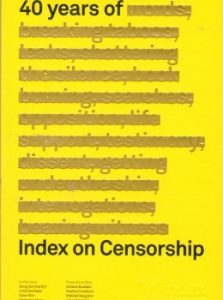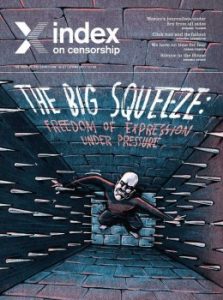15 Jan 2020 | About Index, Azerbaijan, Media Freedom, media freedom featured, News and features, Press Releases
Azerbaijan authorities should lift a travel ban against award-winning investigative journalist Khadija Ismayilova, UK-based rights groups urged on 15 January.
Ismayilova was detained in December 2014 and sentenced in September 2015 to seven-and-a-half years in prison on trumped-up charges. She was conditionally released in May 2016, but three-and-a-half years later, still remains subject to a travel ban and has been unable to leave the country despite numerous applications to do so.
Lawyers will be seeking permission for Ismayilova to travel to the UK to give evidence in the trial of Paul Radu, a Romanian journalist who is co-founder and executive director of investigative reporting group OCCRP (the Organized Crime and Corruption Reporting Project). Radu is being sued for defamation in London by Azerbaijani MP, Javanshir Feyziyev, over two articles in OCCRP’s award-winning Azerbaijan Laundromat series about money laundering out of Azerbaijan.
Ismayilova, OCCRP’s lead reporter in Azerbaijan, is a key witness in the case.
“Azerbaijan is unjustly and unfairly preventing Khadija Ismayilova from travelling internationally as a means to punish her and stifle the spread of her reporting,” said Index on Censorship chief executive Jodie Ginsberg. “Given the UK’s stated commitment to speak out more publicly on threats to media freedom, we urge Britain to join our calls for Ms Ismayilova to be released from her travel ban.”
As UN special rapporteur David Kaye wrote in 2017, travel bans “deny the spread of information about the state of repression and corruption” in countries and act as a form of censorship. In 2017, Ms Ismayilova was prevented from travelling to receive the Right Livelihood Award, the alternative Nobel Prize, for her reporting in Azerbaijan.
“This travel ban is one of many examples of the Azerbaijani authorities’ longstanding persecution of Khadija Ismayilova for her courageous investigative reporting, and she is one of dozens of journalists and activists currently subjected to such measures in Azerbaijan. The ban should be immediately lifted, she should be acquitted of the bogus charges it stemmed from, and she should be allowed to travel to give testimony in this alarming case against another investigative journalist,” said Rebecca Vincent, UK Bureau Director for Reporters Without Borders.
The case against Paul Radu will commence on 20 January.
“Thanks to reporting by Khadija Ismayilova and her colleagues, we know more about how money stolen from the people of Azerbaijan has found its way into luxury London property,” said Daniel Bruce, Chief Executive of Transparency International UK. “Preventing her from giving evidence is a clear attempt to bully and silence those who dare expose the truth. As a defender of free speech and the rule of law, the UK Government should call for her freedom to travel to Britain to provide evidence in this important libel case.”
3 Jan 2020 | Azerbaijan, Europe and Central Asia, Media Freedom, media freedom featured, News and features, Press Releases, Romania, United Kingdom
[vc_row][vc_column][vc_column_text]The UK should make it harder for powerful individuals and companies to bring libel actions or use other vexatious legal threats designed to stifle investigative journalism, Index on Censorship said on Friday.
Launching a new project that aims to expose the extent to which those with wealth and influence use legal threats to shut down investigations into their practices, Index said that – despite recent changes to UK law – more needs to be done both in Britain and abroad to tackle spurious lawsuits.
“Defamation law was reformed in 2013 to make it harder for people who had little or no connection to the UK to bring lawsuits here,” said Index on Censorship chief executive Jodie Ginsberg. “However, we are still seeing people and organisations with almost no UK links bringing expensive and spurious defamation cases. In addition, increasingly people are turning to privacy and data protection laws in an attempt to prevent journalists reporting on corrupt, illegal or poor practice.”
Ginsberg said UK law firms were also among the most heavily involved in legal threats to journalists outside the UK. “This needs to stop,” she said.
Later this month, the UK courts will hear the case of Paul Radu, investigative journalist and founder of the Organized Crime and Corruption Reporting Project (OCCRP). Radu, a Romanian citizen, is being sued by Azerbaijani MP Javanshir Feyziyev, who was named in an award-winning OCCRP report exposing money-laundering. Feyziyev is a sitting MP in Azerbaijan, though says he lives in London, and most of the readers of the stories about Azerbaijan are not from the UK.
Index on Censorship, which campaigns on freedom of expression issues globally and publishes Index on Censorship magazine, has become increasingly worried about the growing use of vexatious lawsuits since it first launched a project monitoring threats to media freedom in Europe in 2013.
“News outlets find themselves receiving a letter threatening expensive proceedings unless online articles are rewritten or removed altogether, and demanding an agreement not to publish anything similar in the future. The letters often tell the recipient that they cannot even report the fact that they have received the letter,” said Ginsberg.
Such suits are a particular problem for independent media outlets and other small organisations. They are financially draining and can take years to process. Faced with the threat of a lengthy litigation battle and expensive legal fees, many who receive such threats are simply forced into silence.
Daphne Caruana Galizia, the Maltese investigative journalist who was assassinated in October 2017, had numerous lawsuits pending at the time of her murder, with some of the lawsuits brought by UK firms.
Index will launch its research project into the use of vexatious legal threats against journalists later this month and aims to interview journalists and media organisations across Europe about the extent of these threats before a final report containing recommendations for action later in the year.
For more information please contact: Jodie Ginsberg
[email protected]
About Index on Censorship
Index on Censorship is a London-based non-profit organisation that publishes work by censored writers and artists and campaigns against censorship worldwide. Since its founding in 1972, Index on Censorship has published some of the greatest names in literature in its award-winning quarterly magazine, including Samuel Beckett, Nadine Gordimer, Mario Vargas Llosa, Arthur Miller and Kurt Vonnegut. It also has published some of the world’s best campaigning writers from Vaclav Havel to Elif Shafak.[/vc_column_text][/vc_column][/vc_row][vc_row][vc_column][vc_basic_grid post_type=”post” max_items=”3″ grid_id=”vc_gid:1578045297237-8e308956-998b-5″ taxonomies=”5692″][/vc_column][/vc_row]
13 Dec 2019 | Magazine, Magazine Contents, Volume 48.04 Winter 2019
[vc_row][vc_column][vc_custom_heading text=”With contributions from Jeffrey Wasserstrom, Miriam Grace Go, Tammy Lai-ming Ho, Karoline Kan, Rob Sears, Jonathan Tel and Caroline Lees”][/vc_column][/vc_row][vc_row][vc_column][vc_column_text]
 The Winter 2019 issue of Index on Censorship magazine looks at the current pack of macho leaders and how their egos are destroying our freedoms. In this issue Rappler news editor Miriam Grace Go writes about how the president of the Philippines, Rodrigo Duterte, tries to position himself as the man by being as foul-mouthed as possible. Indian journalist Somak Goshal reports on how Narenda Modi presents an image of being both the guy next door, as well as a tough guy – and he’s got a large following to ensure his message gets across, come what may. The historian Jeffrey Wasserstrom considers exactly who the real Chinese leader Xi Jinping is – a man of poetry or military might? And Stefano Pozzebon talks to journalists in Brazil who are right in the firing line of Jair Bolsonaro’s vicious attacks on the media. Meanwhile Mark Frary talks about the tools that autocrats are using to crush dissent and Caroline Lees looks at the smears that are becoming commonplace as a tactic to silence journalists. Plus a very special spoof on all of this from bestselling comedic writer Rob Sears.
The Winter 2019 issue of Index on Censorship magazine looks at the current pack of macho leaders and how their egos are destroying our freedoms. In this issue Rappler news editor Miriam Grace Go writes about how the president of the Philippines, Rodrigo Duterte, tries to position himself as the man by being as foul-mouthed as possible. Indian journalist Somak Goshal reports on how Narenda Modi presents an image of being both the guy next door, as well as a tough guy – and he’s got a large following to ensure his message gets across, come what may. The historian Jeffrey Wasserstrom considers exactly who the real Chinese leader Xi Jinping is – a man of poetry or military might? And Stefano Pozzebon talks to journalists in Brazil who are right in the firing line of Jair Bolsonaro’s vicious attacks on the media. Meanwhile Mark Frary talks about the tools that autocrats are using to crush dissent and Caroline Lees looks at the smears that are becoming commonplace as a tactic to silence journalists. Plus a very special spoof on all of this from bestselling comedic writer Rob Sears.
In our In Focus section, we interview Jamie Barton, who headlined this year’s Last Night at the Proms, an article that fits nicely with another piece on a new orchestra in Yemen from Laura Silvia Battaglia.
In our culture section we publish a poem from Hong Kong writer Tammy Lai-ming Ho, which addresses the current protests engulfing the city, plus two short stories written exclusively for the magazine by Kaya Genç and Jonathan Tel. There’s also a graphic novel straight out of Mexico.
[/vc_column_text][/vc_column][/vc_row][vc_row][vc_column][vc_custom_heading text=”Special Report”][/vc_column][/vc_row][vc_row][vc_column][vc_column_text]Will the real Xi Jinping please stand up by Jeffrey Wasserstrom: China’s most powerful leader since Mao wears many hats – some of them draconian
Challenging Orbán’s echo chamber by Viktória Serdült: Against the odds a new mayor from an opposition party has come to power in Budapest. We report on his promises to push back against Orbán
Taking on the lion by Stefano Pozzebon: With an aggressive former army captain as president, Brazilian journalists are having to employ bodyguards to keep safe. But they’re fighting back
Seven tips for crushing free speech in the 21st century by Rob Sears: Hey big guy, we know you’re the boss man, but here are some tips to really rule the roost
“Media must come together” by Rachael Jolley and Jan Fox: Interview with the New York Times’ lawyer on why the media needs to rally free speech. Plus Trump vs. former presidents, the ultimate machometer
Tools of the real technos by Mark Frary: The current autocrats have technology bent to their every whim. We’re vulnerable and exposed
Modi and his angry men by Somak Ghoshal: India’s men are responding with violence to Modi’s increasingly nationalist war cry
Global leaders smear their critics by Caroline Lees: Dissenters beware – these made-up charges are being used across borders to distract and destroy
Sexism is president’s power tool by Miriam Grace Go: Duterte is using violent language and threats against journalists, Rappler’s news editor explains
Stripsearch by Martin Rowson: Putin, Trump, Bolsonaro – macho or… nacho?
Sounds against silence by Kaya Genç: Far from a bad rap here as Turkey’s leading musicians use music to criticise the government
Un-mentionables by Orna Herr: The truths these world leaders really can’t handle
Salvini exploits “lack of trust” in Italian media by Alessio Perrone: The reputation of Italian media is poor, which plays straight into the hands of the far-right politician
Macho, macho man by Neema Komba: A toxic form of masculinity has infected politics in Tanzania. Democracy is on the line
Putin’s pushbacks by Andrey Arkhangelskiy: Russians signed up for prosperity not oppression. Is Putin failing to deliver his side of the deal?[/vc_column_text][/vc_column][/vc_row][vc_row disable_element=”yes”][vc_column][vc_custom_heading text=”Global View”][vc_column_text]Trying to shut down women by Jodie Ginsberg: Women are being forced out of politics as a result of abuse. We need to rally behind them, for all our sakes[/vc_column_text][/vc_column][/vc_row][vc_row][vc_column][vc_custom_heading text=”In Focus”][vc_column_text]Dirty industry, dirty tactics by Stephen Woodman: Miners in Brazil, Mexico and Peru are going to extremes to stop those who are trying to protest
Music to Yemen’s ears by Laura Silvia Battaglia: Could a new orchestra in Yemen signal the end of oppressive Houthi rule? These women hope so
Play on by Jemimah Steinfeld: The darling of the opera scene, Jamie Barton, and the woman behind a hit refugee orchestra, discuss taboo breaking on stage
The final chapter by Karoline Kan: The closing of Beijing’s iconic Bookworm has been met with cries of sadness around the world. Why?
Working it out by Steven Borowiec: An exclusive interview about workplace bullying with the Korean Air steward who was forced to kneel and apologise for not serving nuts correctly
Protest works by Rachael Jolley and Jemimah Steinfeld: Two activists on how their protest movements led to real political change in Hungary and Romania
It’s a little bit silent, this feeling inside by Silvia Nortes: Spain’s historic condemnation of suicide is contributing to a damaging culture of silence today[/vc_column_text][/vc_column][/vc_row][vc_row][vc_column][vc_custom_heading text=”Culture”][vc_column_text]Hong Kong writes by Tammy Lai-ming Ho: A Hong Kong poet talks to Index from the frontline of the protests about how her writing keeps her and others going. Also one of her poems published here
Writing to the challenge by Kaya Genç: Orna Herr speaks to the Turkish author about his new short story, written exclusively for the magazine, in which Turkish people get obsessed with raccoons
Playing the joker by Jonathan Tel: The award-winning writer tells Rachael Jolley about the power of subversive jokes. Plus an exclusive short story set in a Syrian prison
Going graphic by Andalusia Knoll Soloff and Marco Parra: Being a journalist in Mexico is often a deadly pursuit. But sometimes the horrors of this reality are only shown in cartoon for, as the journalist and illustrator show[/vc_column_text][/vc_column][/vc_row][vc_row][vc_column][vc_custom_heading text=”Index around the world”][vc_column_text]Governments seek to control reports by Orna Herr: Journalists are facing threats from all angles, including new terrorist legislation[/vc_column_text][/vc_column][/vc_row][vc_row][vc_column][vc_custom_heading text=”Endnote”][vc_column_text]Culture vultures by Jemimah Steinfeld: The extent of art censorship in democracies is far greaten than initially meets the eye, Index reveals[/vc_column_text][/vc_column][/vc_row][vc_row][vc_column width=”1/3″][vc_custom_heading text=”Subscribe”][vc_column_text]In print, online, in your mailbox, on your iPad.
Subscription options from £18 or just £1.49 in the App Store for a digital issue.
Every subscriber helps support Index on Censorship’s projects around the world.
 SUBSCRIBE NOW[/vc_column_text][/vc_column][vc_column width=”1/3″][vc_custom_heading text=”Read”][vc_column_text]The playwright Arthur Miller wrote an essay for Index in 1978 entitled The Sin of Power. We reproduce it for the first time on our website and theatre director Nicholas Hytner responds to it in the magazine
SUBSCRIBE NOW[/vc_column_text][/vc_column][vc_column width=”1/3″][vc_custom_heading text=”Read”][vc_column_text]The playwright Arthur Miller wrote an essay for Index in 1978 entitled The Sin of Power. We reproduce it for the first time on our website and theatre director Nicholas Hytner responds to it in the magazine
READ HERE[/vc_column_text][/vc_column][vc_column width=”1/3″][vc_custom_heading text=”Listen”][vc_column_text]In the Index on Censorship autumn 2019 podcast, we focus on how travel restrictions at borders are limiting the flow of free thought and ideas. Lewis Jennings and Sally Gimson talk to trans woman and activist Peppermint; San Diego photojournalist Ariana Drehsler and Index’s South Korean correspondent Steven Borowiec
LISTEN HERE[/vc_column_text][/vc_column][/vc_row]
17 Oct 2019 | News and features, Student Reading Lists
[vc_row][vc_column][vc_column_text]Index on Censorship was established in 1972 in a febrile period: Idi Amin had taken power in Uganda, the Vietnam war continued, direct rule was imposed in Northern Ireland, there was a coup in Bolivia and Congo was renamed Zaire by its dictator president. As writer Robert McCrum said in our 40th anniversary issue: “The abuses of freedom worldwide in the 1970s were so appalling and so widespread that the magazine rapidly found itself in the frontline of campaigns. Index became a clarion voice in the cause of free expression.” The right to protest and freedom of expression are now being sought in Hong Kong and elsewhere, and Index is still to the forefront in reporting abuses. Here are just some of the conflicts between freedom and dictatorship we have reported on in the past 47 years.

The first issue of Index on Censorship magazine, in March 1972
The Clockwork Show vol 1, issue 1, March 1972
In an anonymous article about life in Greece under the regime of the Colonels’ junta, the writer considered the psychology of the situation; the feelings and attitudes, the long-ranging impact of this harrowing experience. “There is nothing more demoralizing than to be bound to a public body, an administration, a government with which one can never for a moment identify, which is the exact opposite of everything one believes in. One cannot live side by side with Philistinism, chauvinism, bigotry, blatant hypocrisy, crass ignorance, injustice, violence and brutality and not be affected by them, even if one manages—only just—to keep them out of one’s own life. Under this regime there is no relief; no exception: the regime has penetrated every single aspect of public life.”
Read the full article

March 1974: TV, politics and Chile Index on Censorship magazine
Book burning and brutality vol 3, issue 1, March 1974
A fascinating insight into life in Chile six months after a coup ended the tyranny of President Salvador Allende: worse was to come under a military dictatorship, reported Michael Sanders, an Englishman in Santiago. “When Allende left Chile to address the UN in December 1972, a leading opposition newspaper had as its front-page a photo depicting the president flushing himself down a lavatory, with the caption ‘ good riddance’. The contrast in December 1973 is gloomy indeed. Not so much, or not only because of the drab uniformity of censored newspapers that, for all they may be censored, willingly reflect the views of the Military Junta. But for the fact that 43.6% of the population have been deprived of all means of expression, of all normal communication, and live in daily fear of their lives and jobs.”
Read the full article

Russia, East Germany, South Africa: May 1979 Index on Censorship magazine
Black journalists under apartheid volume 8, issue 3, May 1979
William A Hachten reports: Black journalists came to the fore in the Soweto riots of 1976 when they reported from the ghetto for a white press without access. Yet black journalists still faced daily harassment under apartheid, which worsened with the death of Steve Biko in 1977. Vusi Radebe, a black stringer for the Rand Daily Mail, said: “The situation is worse since the 1976 riots. Police will beat up reporters on the slightest provocation for what they consider obstruction of justice.” While whites had 23 newspapers, there were none for non-whites to express their political frustration. Black journalist Pearl Luthuli said: “The black journalist can’t be objective. We try to tell it like it is but the white editors won’t print it.” Another said: “We are black people first, journalists second. If it comes to a conflict between the struggle and the job, the struggle comes first.”
Read the full article

Beckett and Havel: Index on Censorship magazine, February 1984
Iran under the party of God, volume 13, issue 1, February 1984
“Censorship was planned by the regime of the Islamic Republic even before the February 1979 revolution brought Ayatollah Khomeini’s theocratic oligarchy to power. This particular kind of censorship may not be without precedent in history, but it must certainly be rare. There were attacks on coffee-houses, restaurants and other public places by men armed with clubs and stones; unveiled women were harassed; slogans of the opposition were cleaned from the walls; banks, cinemas and theatres were burned” – a personal account of the first years of the revolution and its attack on culture, by one of Iran’s leading writers Gholam Hoseyn Sa’edi. “And it keeps on happening. The Islamic regime of today has gone a step beyond censoring the creations of science, culture and art, beyond censoring life itself: it has rendered life vain and all but unliveable.”
Read the full article

Romania, Albania, USSR: Index on Censorship magazine January 1991
A sense of solidarity, volume 20, issue 1, January 1991
Romania’s celebrated poet, Ana Blandiana, on censorship under Ceausescu and how she fought back. Her work was completely banned three times. “In my case, the form of censorship progressed from the banning of a word to that of a line, then of a poem, then of a book, to the total erasure of my signature as author: an eradication of identity. My inner freedom was assured by a decision I took in 1980, a personal one rather than as a writer. I decided to be outspoken and say what I thought at the risk of becoming a victim myself, rather than suspect a possibly honest person. At first it kept me sane, and then it helped me to be a normal writer, relatively free of self-censorship. This was the strongest form of censorship under Communism in the last 10 or 15 years, and was much more refined and subtle than the official censorship.”
Read the full article

How free is the Russian media? Index on Censorship, Spring 2007
The Big Squeeze, volume 37, issue 1, Spring 2008
“The fact remains that since the departure of the oligarchs, Russian media freedom has gone from the imperfect and beleaguered to the moribund. At national television, which 90 per cent of Russians say is their main source of news, editors receive weekly or even daily instructions from the Kremlin on the ‘line to take’ on important stories; around half of Russian viewers think that what they watch is objective, a 2007 poll said. Foreign coverage is polemical and outrageously politicised. The message of all this is ‘be quiet’. If you annoy the rich and powerful you face threats, beatings or death. Even when the Kremlin is not directly involved, its reaction to the persecution of journalists sends a clear message: if you offend the powerful, don’t expect the law to protect you.” Edward Lucas gave an early taste of what freedom of expression meant under Putin.
Read the full article

40 years of Index on Censorship March 2012
Grit in the engine, volume 41, issue 1, Spring 2012
Robert McCrum on the 40th anniversary of Index on Censorship. “The success of Index was not a foregone conclusion. Stephen Spender, its founder, was fully alert to the potential for windbaggery and failure. There was, he wrote, ‘the risk that the magazine will become simply a bulletin of frustration’. Actually, the opposite came to pass. Index became a clarion voice in the cause of free expression. The abuses of freedom worldwide in the 1970s were so appalling and so widespread that the magazine rapidly found itself in the frontline of campaigns. Perhaps the most important thing Index did, from the beginning, was to universalise an issue in peril of becoming a special interest: freedom was not ‘a luxury enjoyed by bourgeois individualists’. Along with self-expression, it was a human right, and an instrument of human consciousness.
Read the full article

The big squeeze: Index on Censorship magazine Spring 2017
Freedom of expression under pressure, volume 46, issue 1, Spring 2017
The spring 2017 issue of Index on Censorship magazine looks at how pressures on free speech are currently coming from many different angles, not just one. Special features on how to spot fake news, articles from former BBC World Service director Richard Sambrook and former UK attorney general Dominic Grieve, an exclusive interview with the Spanish puppeteer arrested last year, and fiction from award-winning writer Karim Miské.
[/vc_column_text][/vc_column][/vc_row]

 The Winter 2019 issue of Index on Censorship magazine looks at the current pack of macho leaders and how their egos are destroying our freedoms. In this issue Rappler news editor Miriam Grace Go
The Winter 2019 issue of Index on Censorship magazine looks at the current pack of macho leaders and how their egos are destroying our freedoms. In this issue Rappler news editor Miriam Grace Go 






